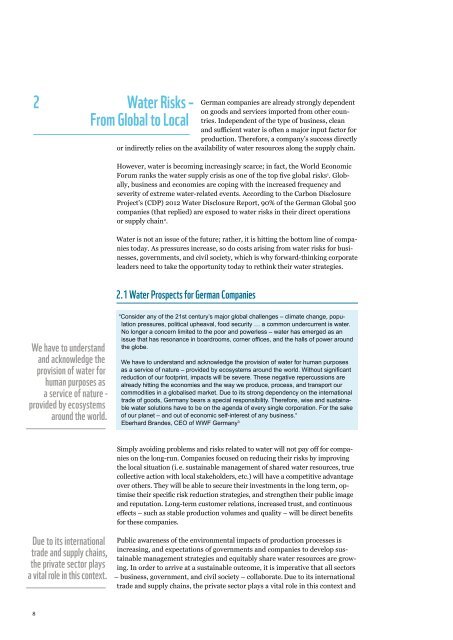YtDl2r
YtDl2r
YtDl2r
You also want an ePaper? Increase the reach of your titles
YUMPU automatically turns print PDFs into web optimized ePapers that Google loves.
2 Water Risks –<br />
From Global to Local<br />
German companies are already strongly dependent<br />
on goods and services imported from other countries.<br />
Independent of the type of business, clean<br />
and sufficient water is often a major input factor for<br />
production. Therefore, a company’s success directly<br />
or indirectly relies on the availability of water resources along the supply chain.<br />
However, water is becoming increasingly scarce; in fact, the World Economic<br />
Forum ranks the water supply crisis as one of the top five global risks 1 . Globally,<br />
business and economies are coping with the increased frequency and<br />
severity of extreme water-related events. According to the Carbon Disclosure<br />
Project’s (CDP) 2012 Water Disclosure Report, 90% of the German Global 500<br />
companies (that replied) are exposed to water risks in their direct operations<br />
or supply chain 2 .<br />
Water is not an issue of the future; rather, it is hitting the bottom line of companies<br />
today. As pressures increase, so do costs arising from water risks for businesses,<br />
governments, and civil society, which is why forward-thinking corporate<br />
leaders need to take the opportunity today to rethink their water strategies.<br />
2.1 Water Prospects for German Companies<br />
We have to understand<br />
and acknowledge the<br />
provision of water for<br />
human purposes as<br />
a service of nature -<br />
provided by ecosystems<br />
around the world.<br />
“Consider any of the 21st century’s major global challenges – climate change, population<br />
pressures, political upheaval, food security … a common undercurrent is water.<br />
No longer a concern limited to the poor and powerless – water has emerged as an<br />
issue that has resonance in boardrooms, corner offices, and the halls of power around<br />
the globe.<br />
We have to understand and acknowledge the provision of water for human purposes<br />
as a service of nature – provided by ecosystems around the world. Without significant<br />
reduction of our footprint, impacts will be severe. These negative repercussions are<br />
already hitting the economies and the way we produce, process, and transport our<br />
commodities in a globalised market. Due to its strong dependency on the international<br />
trade of goods, Germany bears a special responsibility. Therefore, wise and sustainable<br />
water solutions have to be on the agenda of every single corporation. For the sake<br />
of our planet – and out of economic self-interest of any business.“<br />
Eberhard Brandes, CEO of WWF Germany 3<br />
Simply avoiding problems and risks related to water will not pay off for companies<br />
on the long-run. Companies focused on reducing their risks by improving<br />
the local situation (i. e. sustainable management of shared water resources, true<br />
collective action with local stakeholders, etc.) will have a competitive advantage<br />
over others. They will be able to secure their investments in the long term, optimise<br />
their specific risk reduction strategies, and strengthen their public image<br />
and reputation. Long-term customer relations, increased trust, and continuous<br />
effects – such as stable production volumes and quality – will be direct benefits<br />
for these companies.<br />
Due to its international<br />
trade and supply chains,<br />
the private sector plays<br />
a vital role in this context.<br />
Public awareness of the environmental impacts of production processes is<br />
increasing, and expectations of governments and companies to develop sustainable<br />
management strategies and equitably share water resources are growing.<br />
In order to arrive at a sustainable outcome, it is imperative that all sectors<br />
– business, government, and civil society – collaborate. Due to its international<br />
trade and supply chains, the private sector plays a vital role in this context and<br />
8


